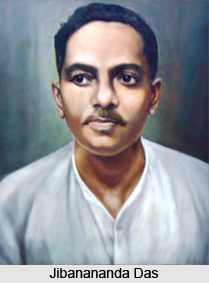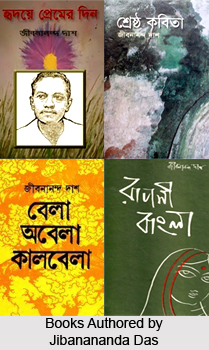 Jibanananda Das with his creative fervour and intellectual vision created a niche where he competed none but himself. Rejecting the temporal and spatial exclusiveness with his clamorous worldview, he was a stand alone pole star, a poet, a traveller in the paths of life, conscious of the senses. Jibananada ensured for himself a separate space as a poet beyond the Rabindranath Tagore`s influential whirlwind. Inspired by western modernism, impressionistic imagery and the intellectual outlook of the Bengali middle class, this group wrote about the realities of the urban present and of the lonely self even while they drew upon the rural traditions of Bengal. Although Jibanananda`s early poems reveal subtle watermarks of Nazrul Islam, Satyendra Nath Dutta and Mohitlal Majumdar, he shook off these influences to become a towering figure in Bengali poetry.
Jibanananda Das with his creative fervour and intellectual vision created a niche where he competed none but himself. Rejecting the temporal and spatial exclusiveness with his clamorous worldview, he was a stand alone pole star, a poet, a traveller in the paths of life, conscious of the senses. Jibananada ensured for himself a separate space as a poet beyond the Rabindranath Tagore`s influential whirlwind. Inspired by western modernism, impressionistic imagery and the intellectual outlook of the Bengali middle class, this group wrote about the realities of the urban present and of the lonely self even while they drew upon the rural traditions of Bengal. Although Jibanananda`s early poems reveal subtle watermarks of Nazrul Islam, Satyendra Nath Dutta and Mohitlal Majumdar, he shook off these influences to become a towering figure in Bengali poetry.
Early Life of Jibanananda Das
Jibanananda Das was born in year 1899 in Barisal, Bangladesh, to a Vaidya-Brahmin family. His father Satyananda Das worked as a schoolmaster, magazine publisher, essayist and founder-editor of a journal of the Brahmo Samaj called Brohmobadi which was dedicated to the exploration of social issues. His mother Kusumkumari Das was a poetess who authored the popular poem `Adorsho Chhele`. Jibanananda Das was the eldest of his siblings. He did his schooling from Brojomohon School, starting at eight year of age as his father was against his admission at an early age. He passed his intermediate examinations from Brajamohan College. Later he attended Presidency College, Kolkata from where he graduated in English literature. He earned his Masters Degree in English from the University of Calcutta. He was also studying law but gave up his studies before completion and joined the English department of City College, Kolkata, as a teacher.
Literary Style of Jibanananda Das
Jibanananda shared Rabindranath`s deep feeling for nature, eloquently describing the beauty of rural Bengal in Rupasi Bangla and earning the appellation of Rupasi Banglar Kavi (Poet of Beautiful Bengal).Unlike Rabindranath, however, he also portrayed distressed humanity as well as the depression, frustration, and loneliness of modern urban life in his poems. Introspection is also an important characteristic of his poetic genius. His poems merge a concern for the present and a sense of history. Many of his poems sound like prose, and greatly influenced subsequent poets. The Bengali readers suddenly discovered a poet with an atypical diction and imagery to twirl before their eyes an intricate verbal web; his poetry vouchsafing a new pulse for his Bengali readers surfeited with Tagorean romanticism.

Literary Works of Jibanananda Das
Jibanananda`s poems of rural Bengal played an important role in the political and cultural perspective of Bangladesh. His poems inspired a pride in Bengali nationhood, especially in the 1960s and during the War of Liberation in 1971. His poetry was infused with an approach towards revolt against decorum to establish intellect as a life force of poetry. Though principally a poet, Jibanananda also wrote essays, short stories and novels. As a novelist and short story writer, however, Jibanananda`s unique talent was realized after his death with the discovery of many of his manuscripts. These novels, which were published posthumously, include Malyaban (Adorned with a Garland 1972), Sutirtha (The Good Pilgrimage, 1977), Jalpaihati, Jibanpranali, Basmatir Upakhyan etc. He wrote about two hundred stories.
A collection of his short stories is Jibanananda Dasher Galpa (Stories of Jibanananda Das, 1972). He also wrote essays on poetry, some of them included in Kavitar Katha (On poems, 1955). His complete works have been published in 12 volumes, as Jibanananda Samagra (The Complete Works of Jibanananda, 1985-96), from Kolkata. Jibananda`s stories and novels analyze the complexities of conjugal life and of sexual relationships as well as the contemporary social and political infrastructure.
His famous work Banalata Sen received an award (1953) at the Nikhil Banga Rabindra Sahitya Sammelan (All Bengal Rabindra Literature Convention). Jibanananda Dasher Shrestha Kavita won the Sahitya Akademi Award in 1954. Banalata Sen had been his disembodied muse, the eighteen lined poetry reaffirms the clandestine aura of the enigma -Banalata, with two strokes of his poetic brush, first, her hair carrying the eternity of perpetual darkness of night and second, and her face bore the sculptures of Sravesti- `Her hair the ancient darkness of Vidisha, /Face a sculpture from Sravasthi.` Thus, her beauty surpassing the plebeian reality stands before man not only as the epitome of beauty but to a certain extent the call of distant wilderness, of sense and a presence abstractly provided; the poet clarifies `A sailor in distant oceans, rudderless, lost/When hooves into view/Island of grass through fronds of cinnamon, /A green relief.`
Banalata Sen therefore seems to be art transfigured into a quintessential beloved rather than a woman of any exclusive identity. This assumption is fortified by the use of the word `wisdom` in the translated text. Like the Grecian Urn, where Keats shared an interpersonal communicative relation with the later and the Urn symbolising the moments trapped in frozen time Banalata Sen serves the similar quest, the similar purpose of trying to captivate the unattainable ideal, where `Beauty is Truth, truth beauty, that is all ye know and all ye need to know.` Jibanananda Das earned the acclamation of being one of the best poets of post-Tagore era by the last year of his life. His demand in various radio recitals, poetry readings and literary conferences rose highly. He published a volume titled `Best Poems` (Sreshttho Kobita) in May 1954 which won the Sahitya Akademi Award in 1955.
Personal Life of Jibanananda Das
Jibanananda Das was married to Labanyaprabha Das since 1930. The latter was associated with the Bengali film industry.
Death of Jibanananda Das
His short creative life ended in a tram accident in Kolkata on 22 October 1954 while he was carelessly crossing a road near Deshapriya Park after a routine evening walk.



















